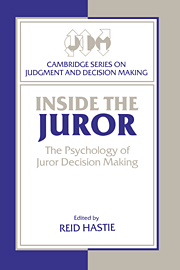Book contents
- Frontmatter
- Contents
- Series preface
- List of contributors
- Editor's preface
- Acknowledgments
- Part I Models of juror decision making
- Part II Commentaries
- 9 Notes on the sampling of stimulus cases and the measurement of responses in research on juror decision making
- 10 Sausages and the law: Juror decisions in the much larger justice system
- 11 A rational game theory framework for the analysis of legal and criminal decision making
- 12 Why do jury research?
- 13 Two conceptions of the juror
- 14 A mathematician comments on models of juror decision making
- Index of names
- Index of subjects
11 - A rational game theory framework for the analysis of legal and criminal decision making
Published online by Cambridge University Press: 04 August 2010
- Frontmatter
- Contents
- Series preface
- List of contributors
- Editor's preface
- Acknowledgments
- Part I Models of juror decision making
- Part II Commentaries
- 9 Notes on the sampling of stimulus cases and the measurement of responses in research on juror decision making
- 10 Sausages and the law: Juror decisions in the much larger justice system
- 11 A rational game theory framework for the analysis of legal and criminal decision making
- 12 Why do jury research?
- 13 Two conceptions of the juror
- 14 A mathematician comments on models of juror decision making
- Index of names
- Index of subjects
Summary
Game theory is a branch of mathematics developed to rigorously treat questions concerning the optimal behavior of participants in situations of uncertainty, conflict, and strategy. In these situations, called games, each participant attempts to maximize his advantage in circumstances where the outcome depends not only on his actions or on those of the natural world but also, most importantly, on the behavior of other participants whose interests are sometimes opposed and sometimes coordinate to his own interests. Most applications of game theory are in the field of economics, but important insights have been provided concerning social behavior as studied by all of the social sciences and, recently, even in evolutionary biology.
Let me start my remarks with an interesting observation on the nature of the decision confronting a juror as I would analyze it in game theory terms. First, I start with a representation of the situation confronting a juror trying to discriminate between cases in which the defendant is guilty as charged and cases in which he or she is innocent. I have picked a representation of the situation that is similar to the signal detection theory-inspired representation introduced by Kerr (this book). In Figure 11.1, I conceptualize cases as lying along a unitary dimension that I will label (as did Kerr) weight of evidence. There are two types of cases, hence two distributions corresponding to states guilty and innocent.
- Type
- Chapter
- Information
- Inside the JurorThe Psychology of Juror Decision Making, pp. 235 - 241Publisher: Cambridge University PressPrint publication year: 1993
- 1
- Cited by



